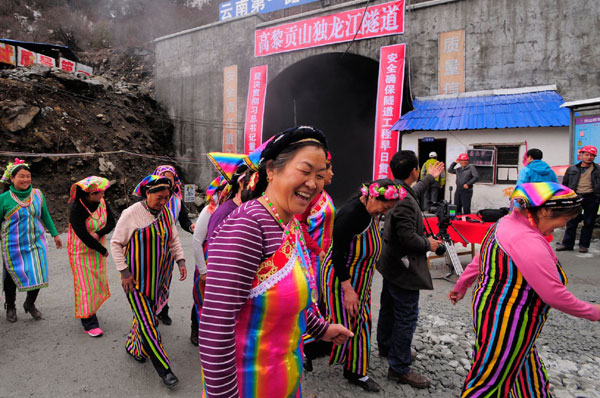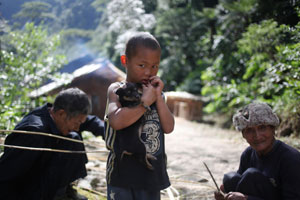Highway tunnel opens world to Derung ethnic group
By Hu Yongqi in Kunming (China Daily) Updated: 2014-04-11 08:04
 |
|
People in Dulongjiang, a township in Yunnan province, celebrate on Thursday after the breakthrough of a highway tunnel through a 3,000-meter mountain. The tunnel forms part of a highway connecting the township populated by the Derung people, China's smallest ethnic group, to the provincial highway network. The route is expected to open in June. Zhou Mingjia for China Daily |
Project will help bring an end to the isolation of ethnic group
A controlled explosion on Thursday signaled the breakthrough of a highway tunnel in the final stage of a project in remote Dulongjiang township to connect China's Derung ethnic group, the country's smallest, with the county seat of Gongshan in Yunnan province.
The highway, which is expected to open in June, will provide a lifeline to the ethnic group, which is cut off from the outside half of every year because of heavy snow.
The project has been underway for four years.
At around 1:28 pm, explosives were set off, and news of the successful breakthrough in the 6.88-kilometer-long tunnel, the longest in Yunnan, exhilarated hundreds of workers and transportation officials who waited anxiously at the tunnel's entrance.
The new tunnel had two construction teams working simultaneously from both ends, the Yunnan transportation department said.
Last month, President Xi Jinping congratulated workers on the highway and sent his wishes for a better life to members of the ethnic group.
Upon its completion, the highway will usher visitors to the border towns that neighbor Myanmar.
The government of Nujiang Lisu autonomous prefecture started the project in January 2011.
 |
|
People from the Derung ethnic group in Xiongdang, a village in Dulongjiang, enjoy leisure time in October 2012. Dulongjiang is cut off from the outside world for nearly six months in winter, when heavy snow blocks mountain roads. Wang Jing/China Daily |
Dulongjiang township, which neighbors the Tibet autonomous region to its north, has been home to China's Derung ethnic group for centuries, and about 70 percent of the ethnic group lives there today.
The remote, mountainous area is known for being cut off from the outside world every year between October to late April because of heavy snow, and for the facial tattoos of the Derung women.
The distance from the township to Gongshan county will be shortened to 76 km from the current 96 km, and the traveling time between Dulongjiang and Gongshan will decrease to two hours from the current six hours, said Zhou Yong, manager of the tunnel project.
Zhou said that compared with another long tunnel in Medog county in the Tibet autonomous region, this one was more difficult because of the complicated rock formation and shortages of food, fuel and construction materials.
"Too much water oozed from the extremely unstable rock, making it hard to drill," Zhou said. "In addition, our work must stop for safety reasons when blizzards come. It means we can work for only six months a year."
In 2012, an excavator was crushed by collapsing rock. Fortunately, no one was seriously injured, Zhou said.
The remote construction site had no steady electricity, and Zhou had five diesel generators working continuously to fuel the heavy equipment.
"It's tremendously difficult for us when the machinery breaks down. We have trouble finding the right components immediately because the county seat is 50 km away. So we always had two machines of the same model, and replaced parts from one to the other," Zhou said.
Locals look forward to the day the highway opens.
"It will be more convenient going to the county seat and Kunming, and I believe my hometown will become better and better," said Deng Liang-hui, 55. "Meanwhile, the opening of the new highway will attract more visitors and businessmen."
Deng worried about the loss of tradition that could come with easier transportation in and out of the region.
"Right now, the township remains as it has been for hundreds of years. My wish is that the government will do something to prevent the traditions from being too commercially exploited. I hope the traditional culture will remain intact," Deng said.
Guo Anfei contributed to the story.
huyongqi@chinadaily.com.cn
- Highway tunnel to complete construction in mid-April
- Light at the end of the highway tunnel
- Anhui's longest highway tunnel begins construction
- Jiulong Lake tourism highway tunnel opened
- Tunnel opens world to Derung
- NE China tunnel collapse workers leave hospital
- Workers rescued from collapsed rail tunnel
- Xinjiang's longest rail tunnel completed
- More female officials caught in corruption
- Whampoa veterans recorded with glory
- Police bust 9 terrorist groups in Xinjiang
- Knife-wielding attackers seized in Xinjiang
- New regulation leads to drop in petitioned cases
- Hunan plant shut as probe into lead poisoning begins
- Police boost efforts to combat gambling
- Project offers jobs openings to legal experts
- Experts: Dog meat festival 'illegal'
- Nation looks to upgrade
pipeline networks






